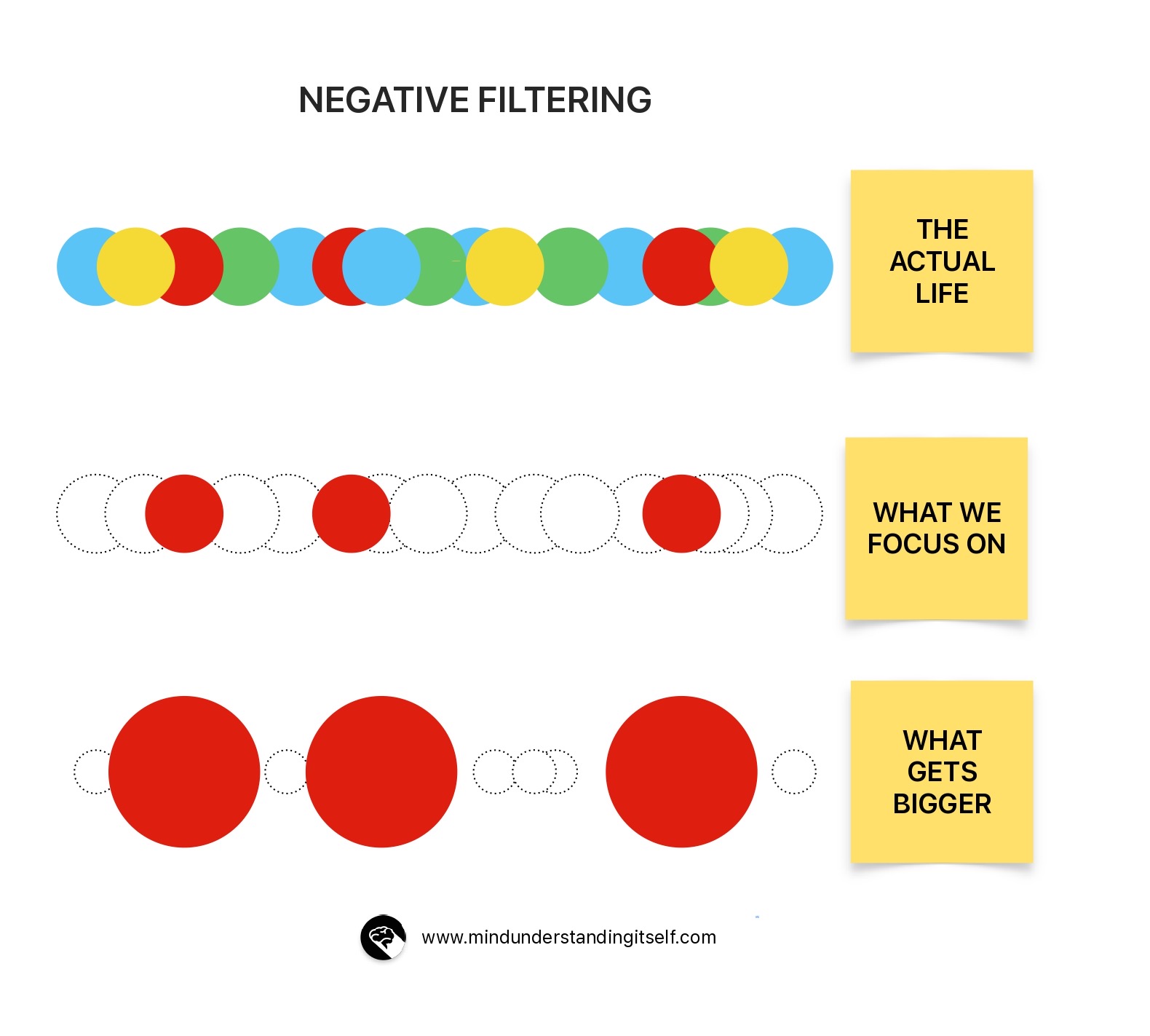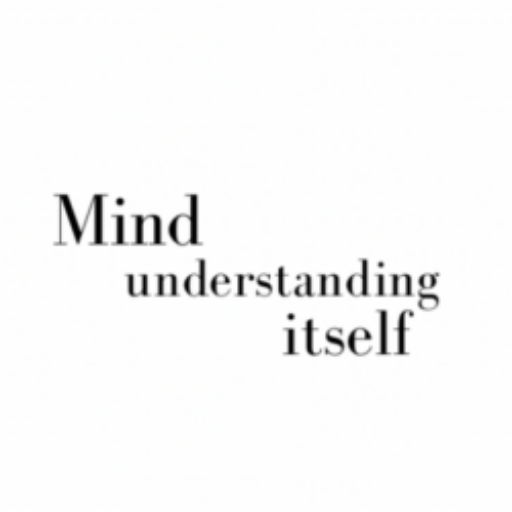Automatic Thoughts and Cognitive Distortions in Anxiety
When we feel anxious, we have certain automatic thoughts more frequently.
If you have noticed, our thoughts during anxiety will usually fit into this formula:
- I don’t know when, but sometime in the future,
- Something bad is going to happen.
- It is going to be so bad that…
- I won’t be able to deal with it.
Also, when we are anxious, due to intense feelings of fear, we see the world in a biased way, and believe these unhelpful thoughts more easily. This is called cognitive distortion.
Yet, when we feel such intense emotions, it is very difficult to realize our biased thinking, and this post is written in order to make it a little bit easier.
There are many types of such biased thinking.
Which cognitive distortions are especially in play when we feel anxious?
1. “I do not know when, but sometime in the future…”
As you might know, anxious thoughts always refer to the future.
When we feel anxious, we feel under the threat of a possible danger. We expect its’ coming, yet we usually do not know its exact time. Therefore, we need to be ready for it every single second.
“My kid might get sick.”
“What if I lose my job?” or “I will lose my job.”
“They will judge me.”
The reality is that:
“My kid might get sick anytime in the future.
I can lose my job anytime in the future.
I might be judged by someone anytime in the future.
Then, I need to be always alarmed and ready.”
Let’s see which cognitive distortions cause us to believe so.
WHAT ARE THE COGNITIVE DISTORTIONS THAT MAKE US LIVE IN THE FUTURE?
Fortune Telling
Fortune telling is one of the main cognitive distortions underlying thoughts referring to the future.
Our brain has a natural tendency to make predictions about future events. This is to make sure that we are well prepared for possible problems and we can survive them.
However, if the event’s probability of happening is low, this strategy is more harmful rather than helpful since we use most of our energy to prepare ourselves for future events that are not present or have a low probability of happening.
Should Statements About Uncertainty and Future
Not being comfortable with uncertainty is a common theme in anxiety.
Should statements or maladaptive assumptions regarding uncertainty and need to predict and control future events are beliefs underlying these thoughts.
“I can’t stand the uncertainty.”
“I have to know that things will work out.”
“I need to prevent any harm.”
“I need to know that my kids will always be safe.”
2. “Something bad is going to happen.”
Sometimes when we feel anxious, we have an idea of the possible danger.
“I am afraid I won’t do very well on the math midterm.”
Sometimes, it is vague.
“I have a bad feeling about this.”
“Anything can happen on such a long journey.”
Due to this uncertainty, we have a constant need to focus on what might go wrong.
“If I don’t know what will happen, I’d better think of every single possible problem beforehand so that I won’t be caught unprepared.”
WHAT ARE THE COGNITIVE DISTORTIONS THAT MAKE US FOCUS ON THE NEGATIVES?
Negative Filtering, Black and White Thinking and What if Questions
Cognitive distortions such as negative filtering, black and white thinking and asking what if questions make us focus on the negatives.
« My grades are all above ninety this semester, except the second biology midterm, which is fifty. I can’t stop thinking about it. What if my cGPA drops…»
Again, this is a preventive mechanism to foresee possible life events and get prepared for them. We are willing to see and solve problems in order to improve our quality of life.
Nevertheless, when we focus only on the negatives, we begin to live in a world of negatives, which is far from reality, let alone it will make us live better lives. Besides, we are more likely to tackle problems when we stay closer to real problems themselves.

3.“It is going to be so bad that…”
Sometimes even if we have an idea of what might go wrong, we do not know how bad it will be.
Magnitude of the harm is uncertain just like its time and content. Thus, we assume the worst.
“I will fail math this semester.”
“I will be homeless.”
“I will die alone.”
WHICH COGNITIVE DISTORTIONS MAKE US ASSUME THE WORST?
Catastrophizing
Catastrophizing is the main cognitive distortion behind assuming the worst.
Catastrophizing is driven by simply fear as well as beliefs such as:
“If focusing on the negatives prepares me for future events, if I assume the worst, I’ll be better prepared.”
Making Emotional Judgments Referring to Catastrophe
Misinterpreting the fear we feel, makes us write terrifying stories about the future, a common cognitive distortion which is called making emotional judgements.
“The fact that I feel this bad is only the proof that everything will fall apart.”
4.“I won’t be able to deal with it.”
Beliefs regarding insufficiency or helplessness are very common in anxiety.
WHAT ARE THE COGNITIVE DISTORTIONS THAT MAKE US FEEL LESS CAPABLE AND LESS RESILIENT?
Catastrophizing
Since we assume the worst, we overestimate the difficulties we might face, which makes us feel less competitive.
Minimizing the positives while maximizing the negatives
As we ignore the good and feed the negatives when we focus on the outside events, we do the same while evaluating our ability to deal with the situation.
Firstly, even if we have the coping skills that will help us deal with the situation, we usually ignore them. We underestimate our strengths and overestimate our weaknesses.
Secondly, even if we have outside support such as help from family or friends, we tend to overlook it.
Comparing Ourselves to Others
We compare our lives to others’ in an unjust way.
“My technique is improving, but I can never be like Michael Phelps.”
Labeling
We are not hesitant to label ourselves.
“I will never succeed because I am too lazy to work that hard.”
Overgeneralization
We predict future events looking at a few past examples.
“I have never been good at math. Why should I succeed this semester?”
Emotional Judgments Referring to Weakness
Although feelings are simply a byproduct of our experiences, we misinterpret difficult emotions as signs of weakness.
“The fact that I feel this bad only means that I won’t be able to deal with it.”
These are the cognitive distortions at the root of our automatic thoughts.
Unfortunately, when we feel such intense emotions, it is very difficult to question our thoughts.
|
If you are interested in how to challenge cognitive distortions, you could refer to our previous post Cognitive Distortions and How to Overcome Them
If you are interested in challenging automatic thoughts, please refer to our previous post How to Challenge Automatic Thoughts in CBT
If you are interested in identifying automatic thoughts, you could refer to Automatic Thoughts: What are They and How can We Identify Them?
Thank you for reading,
Aysegul Karadeniz
|
References
Clark, David A. and Beck, Aaron T. (2011). Anxiety and Worry Workbook – The Cognitive Behavioral Solution. The Guilford Press.
Leahy, R. L. (2005). The worry cure: Seven steps to stop worry from stopping you. Harmony Books.







